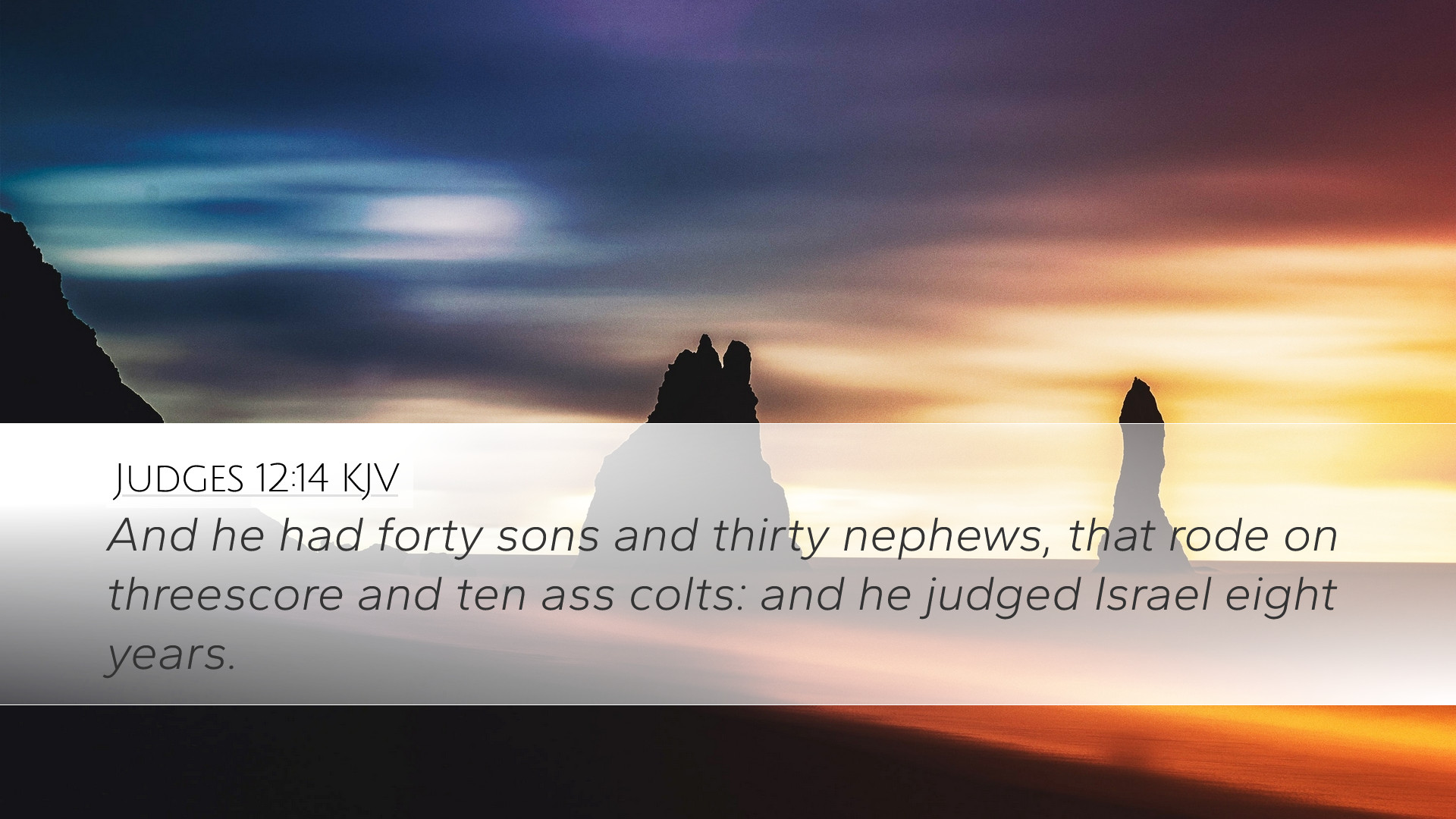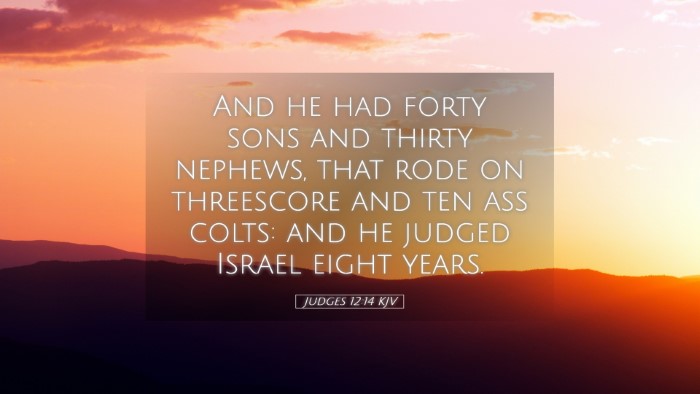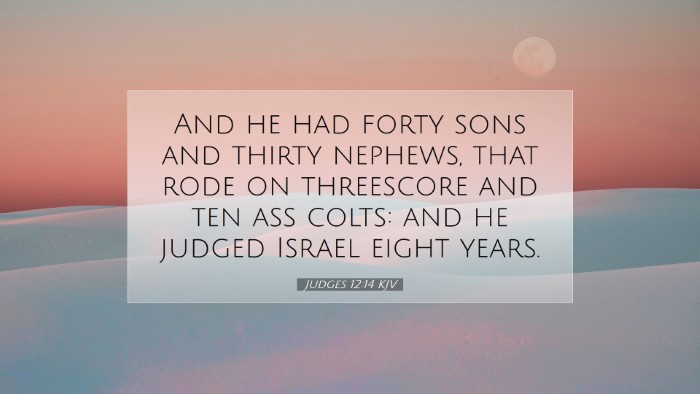Old Testament
Genesis Exodus Leviticus Numbers Deuteronomy Joshua Judges Ruth 1 Samuel 2 Samuel 1 Kings 2 Kings 1 Chronicles 2 Chronicles Ezra Nehemiah Esther Job Psalms Proverbs Ecclesiastes Song of Solomon Isaiah Jeremiah Lamentations Ezekiel Daniel Hosea Joel Amos Obadiah Jonah Micah Nahum Habakkuk Zephaniah Haggai Zechariah MalachiJudges 12:14
Judges 12:14 KJV
And he had forty sons and thirty nephews, that rode on threescore and ten ass colts: and he judged Israel eight years.
Judges 12:14 Bible Commentary
Commentary on Judges 12:14
Verse Summary: Judges 12:14 states: "And he had fourteen sons and thirty grandchildren, and he went down to the gate of the city and judged Israel seven years." This verse succinctly captures the legacy and leadership of Jephthah, illustrating the family tie and the duration of his judgeship.
Historical Context
The Book of Judges provides a narrative of Israel's history in a period characterized by moral decline and disunity. Jephthah, a Gileadite warrior, is a central figure in this book, rising to leadership during a critical time when the Israelites faced oppression from the Ammonites. The mention of his sons and grandchildren signifies the enduring influence of his leadership among his people, an important aspect of the tribal identity in ancient Israel.
Commentary Insights
Matthew Henry's Commentary
Matthew Henry emphasizes the personal qualities of Jephthah that led to his appointment as a judge. He notes how Jephthah's earlier life was marked by rejection; he was the son of a harlot and thus looked down upon by his half-brothers. Yet, despite these adversities, Jephthah's rise to leadership is a testament to God's providence and the potential for redemption. Henry points out that Jephthah's capacity to lead not only reflects his prowess as a warrior but also highlights the spiritual strength that can arise from hardship.
Albert Barnes' Notes
Albert Barnes offers detailed reflections on the numerical significance presented in this verse. He notes that the mention of "fourteen sons and thirty grandchildren" not only illustrates Jephthah's family but also sheds light on the blessings of God towards him. In the Israelite framework, a large family is often seen as a sign of divine favor and fulfillment of God's promises of prosperity. Barnes elaborates on the implications of familial legacy, suggesting that Jephthah's descendants likely carried forward his legacy of leadership and faith.
Adam Clarke's Commentary
Adam Clarke delves into the implications of Jephthah's judgeship, which lasted seven years. He argues that this duration indicates a period of relative peace following Jephthah's military victories. Clarke emphasizes the role of judges as both military leaders and spiritual guides, observing that Jephthah's leadership style likely influenced subsequent judges. He draws attention to the gate of the city where Jephthah judged, a customary location for legal and civil matters in ancient Israel, symbolizing his authority and accountability to the people.
Theological Implications
This verse illustrates several theological themes central to the understanding of leadership in biblical history:
- God’s Sovereignty: Jephthah's ascendancy to judgeship, despite his past, demonstrates God's power to elevate individuals beyond their circumstances.
- Redemption and Restoration: The text shows that God can use those who have been marginalized for great purposes, reflecting a theme of redemption throughout scripture.
- The Importance of Legacy: The mention of Jephthah’s offspring places importance on legacy in biblical narratives and underscores the passing down of leadership qualities and faith across generations.
Practical Applications for Today
For pastors, students, and theologians, Judges 12:14 holds several applications:
- Encouragement for the Marginalized: The story of Jephthah provides hope that one's past does not determine one's future. Leaders today can draw strength from this narrative when encouraging those who feel rejected or overlooked.
- Focus on Family and Legacy: In a contemporary context, the implications of family structures and generational influence in faith are profound. Church leaders should emphasize nurturing the next generation of believers, ensuring the legacy of faith continues.
- The Role of Judges: Understanding the multifaceted role of judges in ancient Israel can inform contemporary leadership practices, where spiritual guidance and moral integrity are just as critical as administrative skills.
Conclusion
Judges 12:14 encapsulates significant themes of leadership, redemption, and legacy within its concise narrative. The insights drawn from esteemed public domain commentaries provide depth to our understanding, emphasizing God’s ability to use unlikely individuals for His purposes. As we reflect on Jephthah’s life and legacy, may we find inspiration for our own journeys, invoking the truths that God equips leaders who faithfully seek Him, transcending their past for a divinely ordained future.


